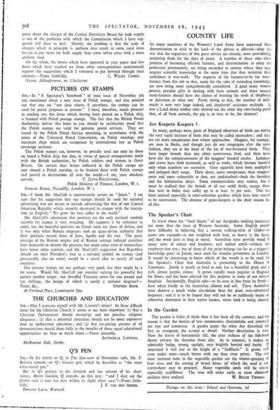COUNTRY LIFE
So many members of the Women's Land Army have expressed their determination to stick to the land—if the phrase is allowed—after the war that the organisers of this great service are already, most providently, preparing them for the days of peace. A nunther of those who show promise of becoming efficient farmers, and determination to enter the profession permanently, are being seconded to centres where they may acquire scientific knowledge at the same time that they maintain their usefulness in war-work. The requests of the farmers-to-be for trans- ference from this job to that, made for the sake of extending knowledge, are now being more sympathetically considered. A good many women possess peculiar gifts in dealing with farm animals and these natural stock-farmers should have the chance of learning the work of shepherds or dairymen or what not. Partly owing to this, the number of milk- maids is now very large indeed, and shepherds' assistants multiply. It was a Land Army worker who showed me the other day convincing proof that, of all farm animals, the pig is, or tries to be, the cleanest! So many members of the Women's Land Army have expressed their determination to stick to the land—if the phrase is allowed—after the war that the organisers of this great service are already, most providently, preparing them for the days of peace. A nunther of those who show promise of becoming efficient farmers, and determination to enter the profession permanently, are being seconded to centres where they may acquire scientific knowledge at the same time that they maintain their usefulness in war-work. The requests of the farmers-to-be for trans- ference from this job to that, made for the sake of extending knowledge, are now being more sympathetically considered. A good many women possess peculiar gifts in dealing with farm animals and these natural stock-farmers should have the chance of learning the work of shepherds or dairymen or what not. Partly owing to this, the number of milk- maids is now very large indeed, and shepherds' assistants multiply. It was a Land Army worker who showed me the other day convincing proof that, of all farm animals, the pig is, or tries to be, the cleanest!
Are Keepers Keepers ? - In many, perhaps most, parts of England observers of birds are noting the very rapid increase of birds that may be called marauders ; and they are yet more conspicuous now winter approaches. Magpies, for example, are seen in flocks, and though jays do not congregate after the same fashion, they are at the head of the list of war-favoured birds. They have larger broods than any other carnivorous bird, and their nests have not the conspicuousness of the magpies' hooded castles. Jackdaws and crows have both increased, as well as rooks, which become harmful only when numbers are excessive. Grey squirrels have both multiplied and enlarged their range. Their dreys, more conspicuous than magpies' nests and more vulnerable to shot, are undisturbed—both the breeding and the hibernation dreys. Some sentimentalists may rejoice, but it must be realised that the broods of all our small birds, except those that nest in holes, may suffer up to at least 70 per cent. This has been noticed especially in semi-suburban gardens which have now ceased to be sanctuaries. The absence of game-keepers is the chief reason for all this.
The Speaker's Chair In travel about the " back blocks " of our Antipodes nothing interested me more than the trees of Western Australia. Some English people have difficulty in believing that a certain walking-stick of Gidea—to quote one example—is not weighted with lead, so heavy is the head, and the wood lasts as long as metal. Australian trees provide wood of many sorts of colour and hardness, and indeed smell—witness the raspberry-jam tree ; but of them all the prize belongs (so far as a tripper's knowledge goes) to Jamb, once used for wooden pavements in London. It would be interesting to know which of the woods is to be used for the Speaker's Chair that Australia is presenting to the House of Commons. Jarrah is nearly as hard as oak, has a beautiful grain and a rich, almost purple, colour. It grows rapidly more popular in England for floors, and has been selected for this purpose in some of our newest hospitals Incidentally, English oaks—to be seen in fine form by Perth— have taken kindly to the Australian climate and soil. These Australian trees deserve a much wider circulation than the giant over-advertised Sequoias ; and it is to be hoped they will not be so ruthlessly burnt or otherwise destroyed in their native haunts, when land is being cleared.
In the Garden The garden is fuller of birds than it has been all the summer, and the reason is that the berries of two cotoneasters (horizontalis and simonsii) are ripe and numerous. A garden paper the other day described the first as evergreen, the second as dwarf. Neither description is true. Now the leaves of horizontalis fall, the utter redness of the fish-bone shoots attracts the thrushes from afar. As to simonsii, it makes an admirable hedge, strong, upright, very brightly berried and hardy. If unprtmed it will rise to the height of a " bullfinch." It grows well even under trees—much better with me than even privet. The two most insistent tasks in the vegetable garden are the winter-spraying of fruit trees and the sowing of broad beans (of which the seed is not everywhere easy to procure). Many vegetable seeds will be scarce, especially cauliflower. The wise will order early, as most allotment Postage on this issue : Inland and Overseas, rd.


























 Previous page
Previous page